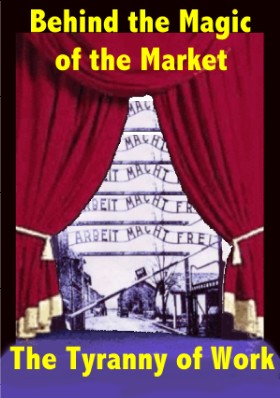Reagan's Magic Market
By J.S. Larochelle, December 2007
(page 3 of 3)

"I have 100 billion dollars... You realize I could spend 3 million dollars a day, every day, for the next 100 years? And that's if I don't make another dime. Tell you what-I'll buy your right arm for a million dollars. I give you a million bucks, and I get to sever your arm right here." -- Bill Gates

photo by J.S. Larochelle, 2002, BC legislature,
arrest of homeless campers from "Camp Campbell"
"A man who sees another man on the street corner with only a stump for an arm will be so shocked the first time he'll give him sixpence. But the second time it'll only be a three penny bit. And if he sees him a third time, he'll have him cold-bloodedly handed over to the police." -- Bertolt Brecht

"Reagan was a bulldog, completely, implacably right-wing on every issue. He was the right-wing Energizer Bunny. He never quit and he kept beating liberals. He cut taxes 25 percent across the board his first year in office; he walked away from Gorbachev at Reykjavik; he fired all those air-traffic controllers - and wouldn't let them come back even when they wanted to; he gave speeches about 'welfare queens' and polluting tree..." --Ann Coulter, "So Now They Think He Was Charming," June 10, 2004

"[Kids] imagine the mythical 'Welfare Queen,' an image Ronald Reagan first conjured up during a speech in the 1980s. " -- Nathan Tobin, "Disrobing the Welfare Queen", July 10, 2000
"As president, Reagan pushed for welfare reform and called public-assistance abusers 'Welfare Queens.'"
"'welfare queens'"
--William Raspberry, "Reagan's Race Legacy", Washington Post, June 14, 2004
"Over a period of about five years, Reagan told the story of the 'Chicago welfare queen' who had 80 names, 30 addresses, 12 Social Security cards, and collected benefits for 'four nonexisting deceased husbands,' bilking the government out of "over $150,000." -- The Mendacity Index, "Which president told the biggest whoppers? You decide."
"He never stopped pounding away at his theory in each and every speech he gave and it became the cornerstone of Reagan domestic policy." -- REAGANOMICS

"By 1980, we knew it was time to renew our faith, to strive with all our strength toward the ultimate in individual freedom consistent with an orderly society. We believed then and now there are no limits to growth and human progress when men and women are free to follow their dreams." -- Ronald Reagan quoted, "Remembering Ronald Reagan" by David Boaz

"Sooner or later, if we want a decent society -- by which I don't mean a society glutted with commodities or one maintained in precarious equilibrium by overbuying and forced premature obsolescence -- we are going to have to come face to face with the problem of work." --Harvey Swados (as quoted in the "Tyranny of Work" by James Rinehart, 1975)
(see also this essay and this)
"Al Gore: [quoting Mark Twain] 'What gets us into trouble is not what we don't know. It's what we know for sure that just ain't so.' | Al Gore: [quoting Upton Sinclair] "It is difficult to get a man to understand something when his salary depends upon his not understanding it."
-- Memorable quotes for An Inconvenient Truth (2006)
CONCLUSION: Back to the issue of interest. Here is an example LIFE has used when doing workshops about money:
10 people are on an island and we agree to form bank to exchange the products we produce. The bank loans each us 10 cents, but we have to pay back 11 cents (to pay for the right to borrow money). Where do we get the extra cent from?
Obviously, some of us would have to default on our loan and go bankrupt...
...or the bank has to simply 'inflate' the money supply from 100 cents to 110 cents in order to create the 'interest' we own to the bank.
In other words, 'bank money,' or 'paper money' or 'fiat money' or 'legal money' represents a mathematical 'origins' impossibility in that we might agree to allow the bank to produce a total money supply of 100% = 100 cents, but on a bank loan of 10 cents that makes paying 10% = 1 cent interest impossible unless the bank creates a money supply of 110% or 110 cents from the beginning.
"One cannot lend people $10 and demand repayment of $11 unless the borrowing of money continues to escalate and of course will ultimately end in loss of all assets by the borrowers."
Oran K. Johnson, Midas Economic Study, Edmonton AB, Oct. 1996 (from letter to editor, sent to Edmonton Journal)
Again, the invention of 'money' seemed like a brilliant solution to the problem of 'trading' or 'exchanging' my product for your product, until WE had to do the actual mathematics of determining how much money to produce and how to pay for the banking system.
Back to page 1, 2
Read more about money in this essay, and why understanding money is essential for the implementation of the guaranteed livable income